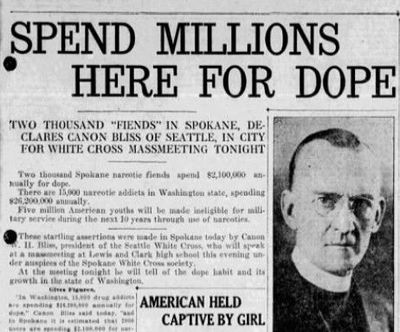This column reflects the opinion of the writer. Learn about the differences between a news story and an opinion column.
100 years ago in Spokane: A growing drug problem was bridging the social and economic gap, an official warned

“Two thousand Spokane narcotic fiends spend $2,100,000 annually for dope.”
That was the alarming statistic cited by Canon W.H. Bliss of the Seattle White Cross as he prepared to hold a mass meeting in Spokane on the narcotics issue.
“America is facing a situation where the young manhood is being destroyed and during the next 10 years, millions of young Americans will not be eligible for military duty because of the use of narcotics,” Bliss said. “… The general opinion prevails that this habit is found among only the lower class of Americans, but I dispute this fact after a year’s work against the evil. We have found in Coast cities that the most prominent society folks and professional men have fallen into the habit.”
From the hospital beat: The Shriners’ national board put a damper on Spokane’s jubilation about landing a Shriners children’s orthopedic hospital.
The board rejected an offer by the John A. Finch estate to donate $100,000 to the hospital in exchange for naming it the Finch Memorial Shrine Hospital.
However, Spokane was still considered the favorite to be the site of a hospital – just without the Finch contribution. The final decision would come in June.
The Finch estate’s offer to fund a Red Cross general children’s hospital, adjacent to the orthopedic hospital, was apparently still intact.
The Spokesman-Review put the best face on this development by saying that Spokane would still get the Shriners hospital, but now the Finch estate’s $100,000 could be freed up for other philanthropic uses.